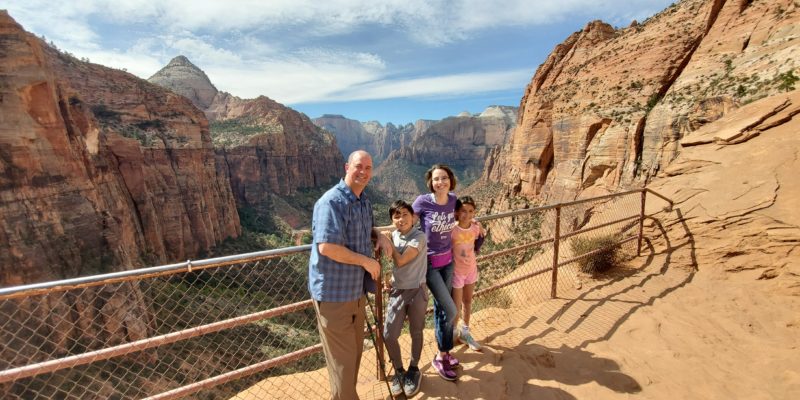Nephi labored diligently with loving kindness to help his brothers experience the plan of happiness by urging them to keep the commandments of the Lord.
God had covenantally promised property, posterity, and prosperity to the children of Abraham (see Genesis 12:1-3) if they were loyal to Him. At Mount Sinai, God revealed the covenantal instructions for loyalty through Moses to the Israelites. Insofar as the Israelites (including Lehi’s family) were loyal to God by keeping the commandments, they experienced the blessings of the Abrahamic covenant. And insofar as they were disloyal to God by purposefully breaking the commandments and refusing to heed God’s loving invitations, they lost His abiding presence and protection.
“And it came to pass that I, Nephi, did exhort my brethren, with all diligence, to keep the commandments of the Lord. And it came to pass that they did humble themselves before the Lord; insomuch that I had joy and great hopes of them, that they would walk in the paths of righteousness.” (1 Nephi 16:4-5, emphasis added)
What was Nephi’s theology? Covenantal loyalty to God.
When Nephi urged his brothers to keep the commandments, Nephi hoped that they would “walk in the paths of righteousness.” This is a covenantal phrase that appears in other areas of scriptures. And it always evokes the sense of being loyal and faithful to God. For example, in Genesis 17:1-2 God told Abraham, “Walk before me…and I will make my covenant between me and thee.” What does it mean to walk before God? A clearer translation would read “walk with me” or “walk by my side.”
In loving relationships, committed individuals walk together side by side. This is what God desires of us. The path of righteousness is to walk by God’s side, to be committed to Him, to be loyal and faithful to Him. Covenantal loyalty to God is expressed by the covenant path which is the path of righteousness.
In his heart full of covenantal love, Nephi ached for his brothers to also fully experience the promises of God. And they could only have those promises realized if they were faithful to God. Nephi was covenantally committed to God and experienced the promised blessings as he so beautifully recorded in 1 Nephi 17:2-3:
“And so great were the blessings of the Lord upon us, that while we did live upon raw meat in the wilderness, our women did give plenty of suck for their children, and were strong, yea, even like unto the men; and they began to bear their journeyings without murmurings. And thus we see that the commandments of God must be fulfilled. And if it so be that the children of men keep the commandments of God he doth nourish them, and strengthen them, and provide means whereby they can accomplish the thing which he has commanded them; wherefore, he did provide means for us while we did sojourn in the wilderness.” (emphasis added)
What we see in these verses is that Nephi fully understood, accepted, and embraced the truth and meaning of God’s covenant to Abraham (see Genesis 12:1-3). That covenantal truth is that God will ensure that a pathway of salvation is provided to all who trust Him. This truth is on display in Genesis 22 where God told Abraham to sacrifice his son Isaac. Abraham had such abiding and implicit trust in God to fulfill His promises to provide him with posterity that Abraham obediently went forth to fulfill God’s commands. When God saw the totality of Abraham’s faithfulness to God, He revealed the salvation for Isaac and Abraham: the ram caught in the thicket.
Because of this unforgettable and providential gift of salvation, Abraham named the location Jehovahjireh, which means, “Jehovah will see to it” or “Jehovah will provide [a pathway of salvation for the faithful]” (see Genesis 22:14).
Like Abraham, Nephi had an unswerving testimony that God would provide means of salvation to all who are faithful to Him. Nephi’s record is constructed around his testimony of the God of Abraham, Isaac, and Jacob who would nourish and deliver the faithful, as he declared in 1 Nephi 1:20:
“I, Nephi, will show unto you that the tender mercies of the Lord are over all those whom he hath chosen, because of their faith, to make them mighty even unto the power of deliverance.”
So what does it mean to walk in the paths of righteousness?
To be totally loyal and faith to God, as was Abraham and Nephi, by keeping His revealed covenantal instructions—the commandments.
How have you seen God provide for you or for others, or how have experienced God’s nourishment in your life as you have demonstrated covenantal loyalty by keeping His commandments?
More from Taylor Halverson
My latest book The Covenant Path in the Bible and the Book of Mormon is now available at Amazon and Deseret Book!

Join my newsletter and receive a free humorous eBook Memoirs of the Ward Rumor Control Coordinator is a light-hearted look at our beloved Mormon Church of Jesus Christ of Latter-day Saints culture. When you join my newsletter, it’s a bit like voting for Pedro. Your wildest dreams might come true!








